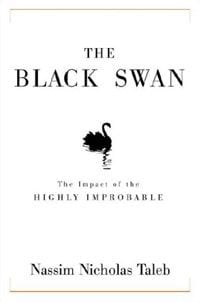
In the beginning, God created … a Black Swan. After all, what was the Big Bang if not a high-impact, unpredictable event impelling human beings to “concoct explanations for its occurrence after the fact”?
The term Black Swan had its origin in an essay by Karl Popper called The Problem of Induction. Popper wrote that “the acceptance of one counterinstance to `All swans are white’ implies the falsity of the law `All swans are white.'”
As it happens, all swans are white — except for the black ones in Australia. So a Black Swan is any unexpected fact or event that is unpredictable precisely because it runs counter to — and therefore overturns — what we have taken for granted as true. September 11, 2001, was a Black Swan, but so was the discovery of penicillin.
Nassim Nicholas Taleb is a graduate of the Wharton School and the University of Paris — and the author, previously, of Fooled by Randomness — who has cut back on his first career as a financial mathematician (specializing in derivatives) to take up another as an epistemologist focusing on the degree to which randomness and uncertainty figure in the course of events.
Taleb traces these fascinations to his years growing up in Lebanon. In his teens, civil war broke out. No one had expected it; everyone thought it would be over in “only a matter of days.” It lasted nearly 17 years. Taleb’s grandfather was defense minister at the time, but “in spite of his position he did not seem to know what was going to happen any more than did his driver, Mikhail.” (In a footnote, Taleb mentions how historian Niall Ferguson has shown that, while volumes have been written “explaining” how World War I came about, the fact remains that “the conflict came as a surprise” to people at the time.)
The principal theme of Taleb’s book is this: how important what we do not know is to a proper understanding of things. And he really means what we do not know: “What many people commoditize and label as `unknown,’ `improbable,’ or `uncertain’ is not the same thing to me; it is not a concrete and precise category of knowledge. … It is the exact contrary of knowledge.”
Taleb tells an interesting story about a brainstorming session on risk held at Lake Como in Italy and sponsored by the Defense Department. It seems that “the military people there thought, behaved, and acted like philosophers. … I came out of the meeting realizing that only military people deal with randomness with genuine, introspective intellectual honesty. … Defense people wanted to understand the epistemology of risk.” Which is why they are comfortable using “the expression unknown unknown (as opposed to known unknown).” Yes, folks, Donald Rumsfeld wasn’t speaking gibberish; he was on the cutting edge of epistemology.
Unsurprisingly, much of Taleb’s book is taken up with exploring the strategies we employ to give us the illusion we know more than we do.
There’s the ludic fallacy, for instance — “basing studies of chance on the narrow world of games and dice.” As Taleb points out, “in real life you do not know the odds; you need to discover them, and the sources of uncertainty are not defined.”
There’s also confirmation error — seeking out evidence to confirm what you believe. Know what? You always manage to find it.
And there’s the narrative fallacy — making a pattern or story out of a series of connected or even disconnected facts. This, unfortunately, is what much written history consists of and also what accounts for the proliferation of facile historical analogies. In fact, the challenge Taleb’s ideas pose to historiography is indeed radical. They suggest that the only valid history is one that would enable us to understand a period in terms of the uncertainty and unpredictability facing those alive at the time. In other words, it would involve reconstructing, as it were, their ignorance.
Space constraints make it possible to touch upon only some of what Taleb discusses in this engrossing book. Epistemological works tend to be classified among the drier forms of discourse, but Taleb writes about the problems of knowing in a way that is not only lively, but downright sassy. If nothing else, his book will make you more aware of how many people — pundits and politicians especially — are given to inflating the little they think they know into giant balloons of prophecy.
Oh, there is also a Black Swan familiar to each and every one of us. Taleb doesn’t mention it until the last page, and I won’t give it away. So if you want to find out what it is, you’ll have to read his book, which you should do anyway, because it’s one of the more important to come along in a while.

![Call for Papers: All Things Reconsidered [MUSIC] May-August 2024](https://www.popmatters.com/wp-content/uploads/2024/04/all-things-reconsidered-call-music-may-2024-720x380.jpg)



